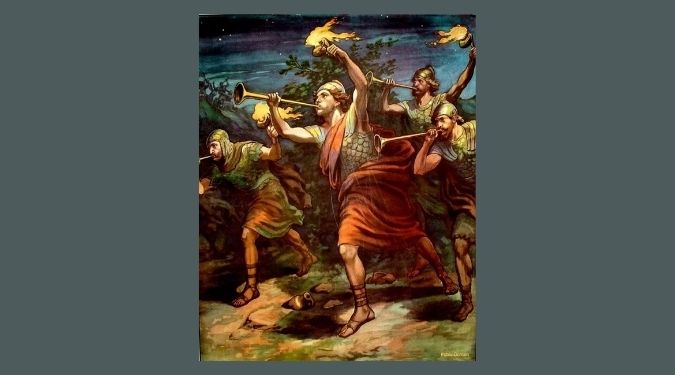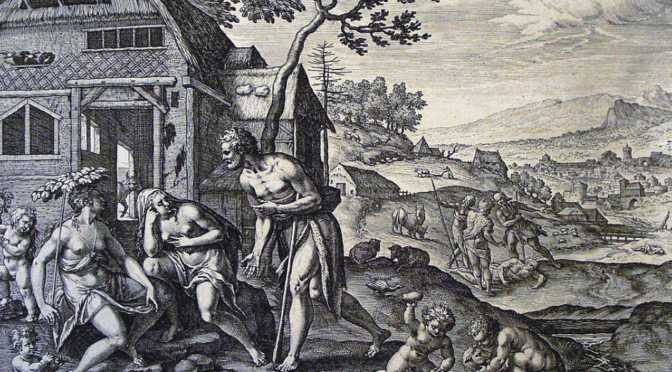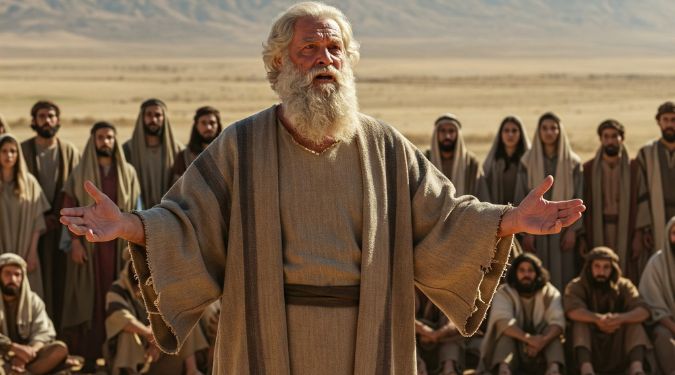If you’ve been following this blog for a while, you know that we’ve been slowly making our way through the Old Testament, following St. Augustine’s advice:
…the New Testament lies hidden in the Old Testament and the Old Testament is unveiled in the New.
Catechism of the Catholic Church, 129
We find ourselves in the Book of Judges, a rather dark book about twelve judges or chieftains. Each of these judges delivered Israel or some part of it, from their enemies for a period of time. There were six major judges, six minor judges, an evil judge, and a prophetess, Deborah. The Book of Judges generally proceeds downhill and its epilog contains this haunting verse, twice:
In those days there was no king in Israel; every man did what was right in his own eyes.”
Judges 17:6; 21:25 RSV
Four of these judges are mentioned in a passage in the eleventh chapter of the Letter to the Hebrews. There, the sacred author, traditionally considered to be St. Paul, holds up a number of biblical heroes as examples:
What more shall I say? I have not time to tell of Gideon, Barak, Samson, Jephthah, of David and Samuel and the prophets, who by faith conquered kingdoms, did what was righteous, obtained the promises; they closed the mouths of lions, put out raging fires, escaped the devouring sword; out of weakness they were made powerful, became strong in battle, and turned back foreign invaders.
Hebrews 11:32-34 NABRE
Gideon, Barak, Samson, and Jephtha. We’ll consider Gideon (pronounced ghid-DOHN in Hebrew) in this post. Pay special attention to St. Paul’s phrase, “out of weakness they were made powerful” in verse 34.
Many of you probably remember something about the story of Gideon. He was called by an angel to deliver Israel from the power of Midian. He then twice called out men from several tribes to battle Midian after testing God with a lamb’s fleece. God then winnowed his army from 30,000 men to 10,000 men, and from 10,000 men to 300 men. These men then routed the army of Midian by surrounding them, making loud war cries, breaking pots, and brandishing torches.
That may represent a summary of what one may read of Gideon in a children’s bible story book, but let’s read his story more closely in the sixth, seventh, and eighth chapters of the Book of Judges.
The story opens in chapter six with the Israelites hiding in dens and caves in fear of the oppressive Midianites. We find Gideon, no braver than the other Israelites, hiding in a wine press in the middle of a vineyard, threshing wheat.
An angel accosts Gideon and tells him:
“Go with the strength you have, and save Israel from the power of Midian. Is it not I who send you?”
Judges 6:14 NABRE
Gideon then complains to the angel that his clan is the weakest in his tribe. That can’t be quite true, because a while later he makes an offering God that is quite costly in this time of famine. Soon thereafter, God tells him to destroy his father’s shrine to Ba’al, he does so with ten of servants, showing that Gideon’s family is definitely not poor and that he was just making an excuse. By the way, Gideon destroyed this shrine to Ba’al at night, because he was afraid of his family and townspeople.
After Midian and its allies gather an army of tens of thousands, something quite pivotal happens. We read in verse 34 of chapter 6:
And Gideon was clothed with the spirit of the Lord, and he blew the horn summoning Abiezer to follow him.
Judges 6:34 NABRE
“Clothed with the Spirit of the Lord.” Do you think that might have something about being made powerful out of weakness?
After gathering a large army together, he tests God not once but twice with a piece of fleece. Once he asks God to allow dew to fall on the fleece alone, leaving the ground dry, and then the next night, he asks God to allow the fleece to remain dry and let the dew fall on the ground. This seems to be the delaying tactic of a coward.
Then it’s God’s turn to test Gideon. Gideon has assembled an army of 32,000 men, and God tells him that there are too many men:
The Lord said to Gideon: You have too many soldiers with you for me to deliver Midian into their power, lest Israel vaunt itself against me and say, “My own power saved me.”
Judges 7:2 RSV
God orders him to tell the men that are afraid to go home. 22,000 go home. God then says that there are still too many men and orders Gideon to test the men by seeing how they drink water. He is to take only those men who lap up the water like dogs. This leaves only 300 men!
God then tells Gideon that if he still is afraid, then he is to take his servant and spy out the enemy camp. Gideon is still afraid, and when he investigates the Midian camp, he is startled to learn that the Midianites are already panicking about the impending battle.
The 300 men then rout the army of Midian by surrounding them, making loud war cries, breaking pots, and brandishing torches, yelling, “A sword for the Lord and for Gideon!” But no swords were used. “Out of weakness they were made powerful.”
Gideon’s story does not end there. The Book of Judges goes on to describe how Gideon massacred the men of Succoth, fellow Israelites, because they failed to give his army bread before the battle.
Gideon captures two Midianite chieftains, Zebah and Zalmunna, and when they are tied up, Gideon, perhaps in fear, orders his young son to kill them. When his son hesitates, the chieftains taunt Gideon and Gideon executes the bound men himself. This was hardly an exercise of bravery.
To Gideon’s credit, when the Israelites ask him to be their king, he tells them,
“I will not rule over you, and my son will not rule over you; the LORD will rule over you.”
Judges 8:23 NABRE
Unfortunately, Gideon backslides by asking Israel to give him a portion of the loot taken from the Midianites. He melts it down into a sacred object which eventually becomes an object of idolatrous worship for his descendants.
I can tell you that I am often a coward with a wavering faith. Gideon was a weak, compromised man with a modest amount of faith that God, of His own initiative, used in a miraculous way. St. Paul invites us to see ourselves in Gideon and the other judges. “Out of weakness they were made powerful” wrote St. Paul. “Go with the strength you have” said the angel to Gideon.
We’ll take a good look at a few more of these flawed heroes in future posts.




We are all cowards moving blindly trying to do what we think we are supposed to do